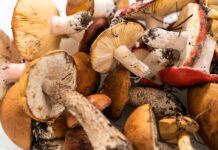
By Lisa Cantkier, Holistic Nutritionist
April is cancer awareness month. Far too many lives have been impacted by cancer and far too many have been lost. In my case, it took away the most important man in my life — my father. I lost him fifteen years ago to pancreatic cancer and I can’t possibly articulate it in words, other than to say my life and world was completely shattered. He was only 52.
According to the Canadian Cancer Society (CCS), cancer is the leading cause of death in Canada and is responsible for 30 per cent of all deaths. Lung, breast, colorectal and prostate cancer are the most common types in Canada and the number of newly diagnosed cases is growing.
Although there’s no denying that factors like genetic mutations and infections are major risk factors, we do have the power to prevent it to a large degree. I’m a big advocate of cancer prevention—through screening, a clean diet (including the avoidance of toxins), lifestyle (including exercise and stress management) and so on. Smoking is a major risk factor and is responsible for about 30 per cent of all cancer deaths. Healthy body weight is another important factor. The CCS states on their website about half of all cancers can be prevented. I bet that number will rise soon. Check out their cancer prevention tool.
I believe nutrition is much more important than we realize, with respect to overall health. In terms of diet, one that’s been found to be helpful for cancer patients and prevention is the ketogenic diet. Ketogenic diet (and) cancer yields 124 results on PubMed.gov. Designed in 1924 by Dr. Russell Wilder, the diet is based on scientific research for epilepsy. It’s been found to be effective in treating epilepsy. It’s adequate in protein, high in fat and is low in carbohydrates. In the liver, fat is converted into fatty acids and “ketone bodies,” which are chemicals made when there is not enough insulin in the blood. As a result, for energy, fat gets broken down instead of sugar. Both glucose levels and insulin resistance reduce. People who go on this diet need to be monitored as creating too many ketone bodies can be toxic. Many health experts believe this diet helps to starve cancer cells (they need sugar to live and grow) and even prevent them. There are different variations of this diet.
To find out about your risk for developing certain cancers and which diet is best for you, talk to your health professional team.










